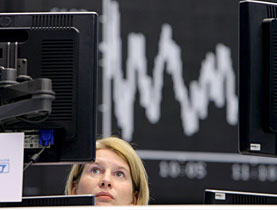Bank bail-out plan was “badly directed”

The $700 billion (SFr767 billion) bank rescue plan, thrown out by United States legislators on Monday night, needs a radical change of direction, experts say.
The head of the Swiss Institute of Banking and Finance at St Gallen University believes that a more efficient use of taxpayers’ money would be to direct emergency funds at bailing out only the weakest banks rather than buying up bad debt across the board.
Professor Manuel Ammann has warned of more banks collapsing and of a global recession if the US fails to restore confidence in the financial system with a cash injection.
“If the bail-out fails completely it would send another strong signal to the market that it is on its own,” he told swissinfo. “As bad loans are written down and losses accumulate it would result in reducing credit in the US.”
“This would deleverage the whole system, having a negative effect on the whole business cycle in the United States. This would most likely lead to a recession that could spread to other countries.”
Jean-Pierre Lehmann, professor of international political economy at Lausanne’s IMD business school, fears that the collapse of the US financial system could lead to “two or three years of hell – something marginally worse than the stagflation of the 1970s.”
Bad plan
But Ammann believes that those banks capable of bearing the losses incurred by their “toxic assets” should be left to their own devices.
“Purchasing the bad debts of banks is a very bad way of stabilising the financial system,” he said. “It would be more effective if the money is specifically targeted at helping those banks in most trouble by injecting additional equity into them. The current situation is so weak that it would be dangerous for new banks to go under with creditors incurring losses.”
Ammann thinks that Switzerland’s two big banks, UBS and Credit Suisse, are relatively safe for the moment, having taken measures to reduce bad debt and increase cash reserves.
Lehmann, however, is less certain about the longer-term future. “We honestly don’t know what is going to happen tomorrow. We are in the eye of the storm and who knows which direction it will suddenly blow?” he asked.
He is further worried that lawmakers will resort to protectionist measures if the crisis deepens much further. Such actions by the US government worsened the situation during the Great Depression of 1929-30.
“The political forces are not always rational. People could be doing all sorts of silly things in a state of panic,” he said.
Regulation
However, both experts agree that enforced changes are necessary to prevent another such crisis in the financial system.
“The market went berserk because the actors involved were pursuing profits in a way that became irrational,” said Lehmann. “Imposing salary caps on executives would be a good thing. Does the banking sector self-regulate? If the answer is no then you correct things like incentive systems.”
“We need regulation, and while I hope that it will not restrict business activity, it should lead to a better capitalised banking system that is less reliant on credit leverage,” said Ammann.
swissinfo, Matthew Allen in Zurich
US legislators on Monday unexpectedly rejected a $700 billion bank rescue plan designed to shore up the country’s financial markets, sparking further alarm on global markets. US president George Bush vowed to get the plan approved despite the political deadlock.
The Dow Jones industrial average recorded its biggest daily points drop in history.
Belgium, France and Luxembourg on Tuesday said they would inject almost €6.4 billion to keep Dexia afloat, the second Belgian bank this week to get a government and shareholder bailout.
In Ireland, the government issued a sweeping guarantee to insure deposits and bank borrowings against a potential collapse.
French President Nicolas Sarkozy, who holds the EU’s presidency, said Europe’s four main economic powers would meet in Paris in the coming days to prepare for a larger summit to deal with the crisis.

In compliance with the JTI standards
More: SWI swissinfo.ch certified by the Journalism Trust Initiative











You can find an overview of ongoing debates with our journalists here . Please join us!
If you want to start a conversation about a topic raised in this article or want to report factual errors, email us at english@swissinfo.ch.